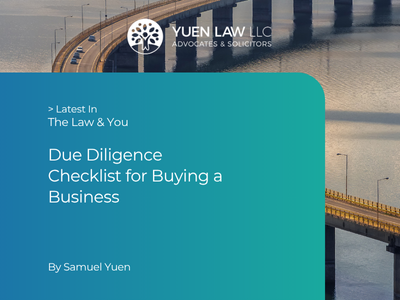This article outlines the process of buying a business, pre-purchase considerations and the benefits of acquiring an established enterprise.
In today’s competitive market, aspiring entrepreneurs often face the dilemma of whether to start a new business or buy over an existing company. While both options have their merits, buying an existing business can offer several distinct advantages.
How to Buy a Business
Step 1: Sourcing for a Target
The first step in buying a business is a comprehensive target search. Prospective buyers should identify their criteria, which may include factors like industry, location, size, and financial performance. Once these criteria are established, research can be conducted using business brokers and industry networks to find potential acquisition targets. Suitable targets may include vendors or competitors.
Step 2: Letter of Intent / Term Sheet
After identifying a suitable target, the next step is to make an offer and enter negotiations. This typically begins with a Letter of Intent (LOI), which outlines the key terms and proposed valuation. The LOI may be a legally binding or non-legally binding document. Sellers often require a Non-Disclosure Agreement (NDA) to protect sensitive information during this stage. In some cases, sellers may also request a good faith deposit to demonstrate the buyer’s intent.
Step 3: Due Diligence
Once the LOI is in place, the buyer will typically conduct thorough due diligence into the business to make an assessment whether to proceed with the acquisition of the business. This critical phase involves financial, legal and operational due diligence.
- Financial due diligence includes a detailed review of financial statements, tax returns, accounts receivable, accounts payable, and cash flow projections.
- Legal due diligence involves investigating any existing legal issues and liabilities, such as lawsuits or regulatory matters that could affect the business and review of material contracts.
- Operational due diligence examines the manner in which the business is conducted, such as looking into the business plans and supply chain relationships.
At the close of the due diligence exercise, the buyer will have a better picture of the business and the due diligence team would have identified any potential red flags. The buyer will be able to make a determination about whether to proceed with the acquisition and the terms of the acquisition.
“Be cautious of material agreements that terminate upon a change of control or management of the company.”
Step 4: Sale and Purchase Agreement & Document Negotiations
After completion of the due diligence exercise, the next stage will be the preparation of the Sale and Purchase Agreement (SPA). This agreement outlines the final purchase price, payment terms, and any conditions that must be met before the sale can close, such as the novation of a tenancy or lease. During this stage, substantive negotiations typically involve back-and-forth discussions aimed at mitigating risks. The SPA may also include indemnities and warranties to protect the buyer from undisclosed liabilities or issues that may arise after the acquisition. Additionally, the SPA may provide for earn-outs, where future payments depend on the business’s performance. In some cases, the buyer may negotiate for the seller to remain involved in the business for a period of time post-acquisition to ensure a smooth handover of the business.“Be prepared to walk away from the deal if it’s not right for you.”
Step 5: Fulfilment of Conditions Precedents
Before completing a business acquisition, certain conditions precedent outlined in the SPA must be fulfilled. These typically include securing regulatory approvals; for instance, businesses operating in regulated industries such as financial services may require approval from the Monetary Authority of Singapore (MAS) for (a) change of control of the business and (b) resignation and appointment of key management, that any director or senior management is deemed a fit and proper person prior to the acquisition.
Additionally, the conditions precedent may include obtaining third-party consents, novating key contracts that are not automatically transferable, resolving any ongoing legal disputes, settling outstanding debts (such as shareholder loans), and renewing essential licenses and permits. Meeting all these requirements is crucial before proceeding to finalise the acquisition.
Step 6: Completion and Notification to Regulatory Authorities
Once the SPA is signed, compliance with local regulations becomes essential. The relevant authorities, such as the Accounting and Corporate Regulatory Authority (ACRA) in the case of a sale of shares in a company must be notified. This notification ensures that all legal requirements are met following the acquisition. Where there is a transfer of shares, stamp duty must also be paid to the Inland Revenue Authority of Singapore (IRAS). Beyond regulatory compliance, it’s important to manage operational aspects, such as the handover of keys to the office and any necessary equipment or assets.
Step 7: Post-Purchase Integration & Take Over
Finally, the integration phase starts with a comprehensive transition plan. This plan is vital for ensuring a smooth takeover and involves effective communication strategies to inform employees, customers, and stakeholders about the change in ownership. Prioritizing cultural integration is essential to minimize friction between staff and management, while operational changes may be needed to enhance efficiency or align with the buyer’s business strategy. Throughout this integration phase, it is crucial to monitor the business’s performance closely to promptly address any issues and ensure that the business meets its projected goals.
FAQ
Yes, foreigners can buy businesses in Singapore and can own 100% of a business just like Singaporeans. The process is straightforward, with few restrictions on foreign ownership for most business types.
Singapore manages foreign investment through sector-specific laws that impose restrictions on ownership and licensing requirements. In regulated sectors like telecommunications, banking, and utilities, investors must seek approval from relevant regulators.
While hiring a lawyer isn’t legally required, it is highly advisable. A lawyer can help you navigate complex legal matters, conduct due diligence, and ensure that all agreements are properly drafted and executed. They can also help manage risks and provide an exit strategy if any red flags arise during the process.
The timeline for buying a business can vary based on the complexity of the transaction and the specific circumstances involved. On average, the process can take anywhere from a few weeks to several months, starting from the initial drafting of the Letter of Intent (LOI) to the final completion of the deal.
Many of our clients use business brokers to find potential targets and explore off-market deals. Additionally, there are several online platforms that list businesses for sale, including:
These resources may help you discover various opportunities available in the market.
These resources and links are provided for your information only and should not be interpreted as approval or endorsement by us of the linked websites or the content therein. By clicking on these links, you will leave our website.

Pre-Purchase Considerations
What to Look Out for When Deciding to Buy a Particular Business
Ensure that the business is compliant with all local regulations and is in good standing with the relevant authorities. This involves verifying business licenses and permits, checking tax compliance, corporate secretarial records and identifying legal or regulatory issues.
A thorough financial analysis can provide insights into the business’s financial health. This includes reviewing financial statements, tax returns, and cash flow projections. Understanding the company’s financial position will allow you to assess its viability and inform your negotiation and valuation strategy.
“Be cautious of contingent liabilities—sometimes a company may not be the direct borrower, but it could be a guarantor for loans.”
Assess the business’s intellectual property (IP) assets, including trademarks, patents, copyrights, and trade secrets. These assets are often central to the company’s competitive advantage and long-term profitability. It’s important to understand the full extent of the IP protection and its value to the business.
However, if the business relies on key IP that it does not own—such as licensed technology or brand rights—there is a potential risk that these licenses might not be renewed, which could disrupt operations. Also, verify whether any products or the business’s brand name might infringe on another party’s patents or trademarks, as this could result in costly legal disputes, fines, or limit the business’s ability to continue selling its’ products.
Review existing contracts with customers, suppliers, and employees. Understand the terms and obligations of these agreements, including any exclusivity clauses, termination rights, and renewal conditions. This review is essential to ensure a smooth transition and to maintain ongoing operations without disruption after the acquisition.
Ensure the business holds all required licenses and permits to operate legally, particularly in regulated sectors like healthcare, finance, or food and beverage. Some licenses may be linked to specific individuals and may not be transferable, meaning you may need to apply for new licenses before completing the sale. Failing to secure these licenses can result in significant liabilities and operational disruptions, such as the inability to legally continue business operations.
Benefits of Buying an Existing Business
Established Customer Base and Book Order
One of the most significant advantages of purchasing an existing business is the immediate access to an established customer base. This means that you can start generating revenue right away rather than spending time building a client base from scratch. An existing business often has a predictable book order, providing financial stability and growth opportunities.
One reason our clients choose to acquire companies is to expand their service offerings horizontally. They seek targets that share a similar clientele, creating opportunities for cross-selling and enhancing the overall book order. For example, a gym specialising in fitness training considered acquiring a wellness center that offered nutrition counselling and chiropractic treatments. They believed that both businesses served similar clients, allowing them to provide a comprehensive health and wellness package to their members.
Existing Brand Recognition & Goodwill
An established business comes with brand recognition and goodwill that can be leveraged for further growth. Customers are already familiar with the brand, which fosters trust and can lead to repeat business and referrals. This recognition can significantly reduce the time and resources typically spent on marketing and brand development, making it easier to acquire new customers.
Experienced and Trained Employees
Buying a business means acquiring not just its assets but also its employees. Existing staff often possess valuable experience and knowledge about the industry, customer relationships, and operational procedures. This can significantly reduce the learning curve and enhance the operational efficiency of the business.
Access to Suppliers and Service Providers
An existing business typically has established relationships with suppliers and service providers. These connections can lead to favourable terms and conditions, ensuring a smooth transition and ongoing operations. New owners can benefit from these established networks, facilitating better procurement and operational logistics.




